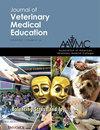Investigation of Neurophobia amongst North American Veterinary Students and Development of a Veterinary Neurophobia Scoring Tool (VetNeuroQ)
IF 1.1
3区 农林科学
Q3 EDUCATION, SCIENTIFIC DISCIPLINES
引用次数: 0
Abstract
“Neurophobia” is a phenomenon in human medical education where students develop negative attitudes towards neurology, impeding student learning and future clinical practice. While suspected to exist in veterinary medical education, it remains unstudied. The main objectives of this study were to examine North American veterinary student attitudes towards neurology and neurology education and explore elements that might contribute to neurophobia. Additional objectives were to evaluate veterinary educators’ perceptions of student neurophobia and to develop and validate a scoring tool (VetNeuroQ) to quantify veterinary neurophobia. Veterinary students and faculty at North American veterinary schools were surveyed. A scoring tool was developed from a subset of questions and validated using confirmatory factor analysis. Six hundred six anonymous responses were collected from students at all stages of veterinary education. Neurology training was reported as insufficient by 35.9% and most respondents perceived neurology to not be easy to learn. Neuroanatomy/physiology and neurolocalization were considered difficult concepts. Students rated low confidence in neurology (vs. other topics), and low interest in the Neurology/Neurosurgery specialty. 61.7% of educators reported neurophobia amongst their students. The proposed VetNeuroQ scale showed high reliability (Cronbach's alpha >0.7) and validity ( p < .05; CFI >0.9, RMSEA <0.08). VetNeuroQ scores were low but improved over the course of veterinary education. These findings demonstrate low self-efficacy, interest, and confidence, along with perceptions of difficulty, amongst veterinary students, consistent with neurophobia. Contributing elements are discussed. The VetNeuroQ scale allows quantification of veterinary student neurophobia and may be useful for screening students and assessing the impact of educational interventions.调查北美兽医专业学生的神经恐惧症并开发兽医神经恐惧症评分工具 (VetNeuroQ)
“神经恐惧症”是人类医学教育中的一种现象,学生对神经学产生了消极的态度,阻碍了学生的学习和未来的临床实践。虽然怀疑存在于兽医教育中,但仍未得到研究。本研究的主要目的是调查北美兽医学生对神经病学和神经病学教育的态度,并探讨可能导致神经恐惧症的因素。其他目标是评估兽医教育者对学生神经恐惧症的看法,并开发和验证一个评分工具(VetNeuroQ)来量化兽医神经恐惧症。对北美兽医学校的兽医学生和教师进行了调查。从问题的子集中开发了一个评分工具,并使用验证性因素分析进行了验证。从兽医教育各个阶段的学生中收集了666份匿名回复。35.9%的受访者认为神经学培训不足,大多数受访者认为神经学不容易学习。神经解剖学/生理学和神经定位被认为是困难的概念。学生们对神经病学的信心较低(与其他学科相比),对神经病学/神经外科专业的兴趣较低。61.7%的教育工作者报告他们的学生有神经恐惧症。提出的VetNeuroQ量表具有较高的信度(Cronbach’s alpha >0.7)和效度(p < 0.05);Cfi >0.9, rmsea <0.08)。VetNeuroQ得分较低,但在兽医教育过程中有所提高。这些发现表明,在兽医学生中,自我效能感、兴趣和信心低下,以及对困难的认知低下,与神经恐惧症一致。讨论了影响因素。VetNeuroQ量表可以量化兽医学生的神经恐惧症,可能对筛选学生和评估教育干预的影响有用。
本文章由计算机程序翻译,如有差异,请以英文原文为准。
求助全文
约1分钟内获得全文
求助全文
来源期刊
CiteScore
2.20
自引率
30.00%
发文量
113
审稿时长
>36 weeks
期刊介绍:
The Journal of Veterinary Medical Education (JVME) is the peer-reviewed scholarly journal of the Association of American Veterinary Medical Colleges (AAVMC). As an internationally distributed journal, JVME provides a forum for the exchange of ideas, research, and discoveries about veterinary medical education. This exchange benefits veterinary faculty, students, and the veterinary profession as a whole by preparing veterinarians to better perform their professional activities and to meet the needs of society.
The journal’s areas of focus include best practices and educational methods in veterinary education; recruitment, training, and mentoring of students at all levels of education, including undergraduate, graduate, veterinary technology, and continuing education; clinical instruction and assessment; institutional policy; and other challenges and issues faced by veterinary educators domestically and internationally. Veterinary faculty of all countries are encouraged to participate as contributors, reviewers, and institutional representatives.

 求助内容:
求助内容: 应助结果提醒方式:
应助结果提醒方式:


